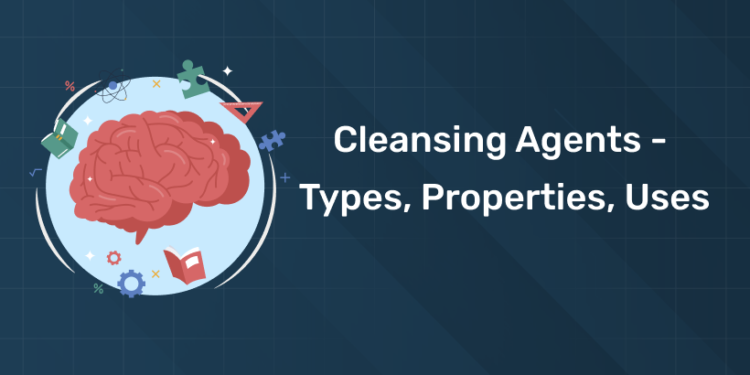Table of Contents
Cleansing agents are a part of our daily lives whether we’re washing our hands, washing our clothes or maintaining hygiene at home. Soaps and synthetic detergents remove dirt, oils, and other impurities from surfaces. Knowing the different types of cleansing agents, their properties and uses will help us make informed decisions on the products we use for personal and household cleaning. In this post we’ll be looking at the different types of cleansing agents, their properties and uses with a focus on the main difference between soaps and synthetic detergents.
Types of Cleansing Agents
Cleansing agents can be broadly classified into two main types: soaps and synthetic detergents. Both clean but they are very different in their composition, properties and uses.
1. Soaps
Soaps are one of the oldest and most used cleansing agents. They are made from natural ingredients which is why many consumers prefer them.
Composition and Formation
Soaps are sodium or potassium salts of fatty acids. Natural sources like animal fats or vegetable oils provide these fatty acids. The process of making soap, called saponification, involves heating fats or oils with a strong alkali such as sodium hydroxide (NaOH) or potassium hydroxide (KOH). The chemical reaction results to the formation of soap and glycerol.
Types of Soaps
- Hard Soaps: Sodium hydroxide makes these soaps solid, and people use them in bars for personal hygiene and laundry purposes.
- Soft Soaps: Potassium hydroxide makes these soaps softer, and people find them in liquid forms like hand washes and body gels.
Properties of Soaps
- Natural Ingredients: Soaps are made from natural fats and oils which makes them biodegradable and eco friendly.
- Alkaline Nature: Soaps are alkaline which can sometimes cause dryness or irritation to sensitive skin.
- Effectiveness in Soft Water: Soaps work best in soft water. In hard water they can form scum which reduces their cleaning efficiency.
Uses of Soaps
- Personal Hygiene: People use soaps for bathing, handwashing, and other personal hygiene practices.
- Laundry: People use hard soaps to wash clothes, especially in soft water areas.
- Household Cleaning: People use soaps for various household cleaning tasks, like washing dishes and cleaning surfaces.
2. Synthetic Detergents
Synthetic detergents are modern cleansing agents that were developed to overcome some of the limitations of traditional soaps. Unlike soaps they don’t contain natural fats or oils.
Composition and Formation
Petrochemicals or oleochemicals make synthetic detergents, which are designed to work well in both soft and hard water. They call these detergents “synthetic” because they derive them from synthetic sources rather than natural fats and oils. Detergents are available in powder, liquid and gel forms.
Types of Synthetic Detergents
- Anionic Detergents: These are the most common type of detergents and are used in all household cleaning products. Anionic detergents have negative ions which are great at removing dirt and grime. Found in laundry detergents, dishwashing liquids and toothpaste.
- Cationic Detergents: These have positive ions and are known for their germicidal properties. Used in disinfectants and fabric softeners. Cationic detergents are less used in household cleaning as they are more expensive and have specific uses.
- Non-Ionic Detergents: As the name suggests non-ionic detergents have no ions. They work in both acidic and alkaline environments and are used in liquid dishwashing detergents and industrial cleaning products.
Properties of Synthetic Detergents
- Versatile: Synthetic detergents work in hard and soft water, for all your cleaning needs.
- Stable pH: Detergents are formulated to have a stable pH, less likely to irritate skin compared to soaps.
- More Cleaning Power: Synthetic detergents are more effective at removing grease, oil and stubborn stains than soaps.
- Environmental Concerns: Some synthetic detergents are not biodegradable, can cause environmental pollution. But eco-friendly options are now available.
Uses of Synthetic Detergents
- Laundry: Detergents are the most used for washing clothes, especially in hard water areas.
- Dishwashing: Dishwashing liquids and powders use both anionic and non-ionic detergents.
- Industrial Cleaning: Industrial settings use non-ionic detergents to clean machinery and equipment.
- Personal Care: Toothpaste and shampoos contain anionic detergents because of their mild cleansing properties.
Specialty Cleansing Agents
Beyond soaps and synthetic detergents there are other specialty cleansing agents for specific uses.
1. Antibacterial Soaps
Antibacterial soaps have additional chemical agents to kill or inhibit bacteria growth. Used in healthcare settings and by individuals who need extra germ protection. But overuse of antibacterial soaps can cause antibiotic resistance and not necessary for everyday use.
2. Enzyme-Based Detergents
Enzyme-based detergents have specific enzymes that break down proteins, fats and carbohydrates. Effective in removing food stains and used in laundry detergents. The enzymes work by catalyzing chemical reactions that break down stains into smaller, more soluble particles.
3. Green Cleansing Agents
Green or eco-friendly products are designed to have minimal environmental impact. Biodegradable and free from phosphates and chlorine. Green cleansing agents are now more popular as consumers become more aware of the environmental and health effects of traditional products.
Quiz: Understanding Cleansing Agents
1: Who was the first woman President of India?
Question 1:
What are soaps primarily made from?
a) Petrochemicals
b) Fatty acids
c) Synthetic polymers
d) Enzymes
Answer: b) Fatty acids
Question 2:
Which process is used to make soap?
a) Fermentation
b) Saponification
c) Distillation
d) Filtration
Answer: b) Saponification
Question 3:
What type of alkali is typically used to produce hard soap?
a) Potassium hydroxide
b) Sodium hydroxide
c) Ammonium hydroxide
d) Magnesium hydroxide
Answer: b) Sodium hydroxide
Question 4:
Which cleansing agent is effective in both soft and hard water?
a) Natural soap
b) Synthetic detergent
c) Hard soap
d) Glycerol
Answer: b) Synthetic detergent
Question 5:
What is the main function of cationic detergents?
a) To enhance color
b) To kill germs
c) To soften water
d) To create foam
Answer: b) To kill germs
Question 6:
Which type of detergent does not contain ions?
a) Anionic detergent
b) Cationic detergent
c) Non-ionic detergent
d) Amphoteric detergent
Answer: c) Non-ionic detergent
Question 7:
What are synthetic detergents primarily made from?
a) Natural fats and oils
b) Petrochemicals
c) Essential oils
d) Plant-based extracts
Answer: b) Petrochemicals
Question 8:
Which type of soap is typically found in liquid hand washes?
a) Hard soap
b) Soft soap
c) Cationic detergent
d) Anionic detergent
Answer: b) Soft soap
Question 9:
Which property of soap can lead to skin dryness?
a) Its acidic nature
b) Its alkaline nature
c) Its neutral pH
d) Its moisturizing effect
Answer: b) Its alkaline nature
Question 10:
What is a common application of anionic detergents?
a) Disinfecting surfaces
b) Adding fragrance to products
c) Household cleaning and toothpaste
d) Conditioning hair
Answer: c) Household cleaning and toothpaste
Question 11:
Which type of detergent is often used in industrial cleaning products?
a) Anionic
b) Cationic
c) Non-ionic
d) Antibacterial
Answer: c) Non-ionic
Question 12:
What additional agent do antibacterial soaps contain?
a) Enzymes
b) Germicidal agents
c) Emulsifiers
d) Fragrance enhancers
Answer: b) Germicidal agents
Question 13:
What is the key advantage of eco-friendly cleansing agents?
a) Lower cost
b) High foaming ability
c) Biodegradability and reduced environmental impact
d) Longer shelf life
Answer: c) Biodegradability and reduced environmental impact
Question 14:
Which substance is used to soften water in synthetic detergents?
a) Sodium chloride
b) Enzymes
c) Builders like sodium tripolyphosphate
d) Citric acid
Answer: c) Builders like sodium tripolyphosphate
Question 15:
What is a major environmental concern with some synthetic detergents?
a) They are biodegradable
b) They increase water hardness
c) They can contribute to water pollution
d) They lack cleaning power
Answer: c) They can contribute to water pollution
Free UPSKILLING Courses!
Take your first step toward mastering in-demand skills, acing interviews, and securing top-tier jobs with Entri's free upskilling courses.
Start Learning!Conclusion
Cleansing agents whether soaps or modern synthetic detergents are a part of our daily lives for hygiene and cleanliness. Each type of cleansing agent has its own properties, advantages and uses. Soaps with natural ingredients are biodegradable and gentle on skin so good for personal hygiene. Synthetic detergents with their versatility and powerful cleaning properties are best for laundry, dishwashing and industrial cleaning.
Knowing the different types of cleansing agents and their properties we can make informed decisions on the products we use at home and on our bodies. Whether you like the traditional soap or the advanced cleaning power of synthetic detergents there’s a cleansing agent for you.
So choose wisely and use wisely. Good for you and the planet.
Free UPSKILLING Courses!
Take your first step toward mastering in-demand skills, acing interviews, and securing top-tier jobs with Entri's free upskilling courses.
Start Learning!Frequently Asked Questions
What are cleansing agents?
Cleansing agents are substances used to remove dirt, oils, and impurities from surfaces, skin, and fabrics. Common types include soaps and synthetic detergents.
How are soaps different from synthetic detergents?
Soaps are made from natural fats and oils through a process called saponification, while synthetic detergents are made from petrochemicals or oleochemicals and are designed to work effectively in both soft and hard water.
What is saponification?
Saponification is the chemical process of making soap by heating fats or oils with a strong alkali, such as sodium hydroxide, resulting in the formation of soap and glycerol.
What are the main types of synthetic detergents?
The main types of synthetic detergents are anionic, cationic, and non-ionic detergents. Each type has different properties and uses.
Why are anionic detergents commonly used in household cleaning products?
Anionic detergents are effective at removing dirt and grease, which makes them ideal for household cleaning products like laundry detergents and dishwashing liquids.
What are the benefits of using cationic detergents?
Cationic detergents have germicidal properties, making them useful for disinfecting surfaces and as fabric softeners.
What are non-ionic detergents, and where are they used?
Non-ionic detergents do not contain charged ions and are effective in both acidic and alkaline environments. They are commonly used in liquid dishwashing detergents and industrial cleaning products.
Why might some people prefer soaps over synthetic detergents?
Some people prefer soaps because they are made from natural ingredients, are biodegradable, and are often gentler on the skin.
Can soaps cause skin dryness?
Yes, soaps can cause skin dryness due to their alkaline nature, especially when used frequently or on sensitive skin.
What are antibacterial soaps, and are they necessary?
Antibacterial soaps contain additional agents designed to kill or inhibit bacteria. While they can be useful in healthcare settings, they are not always necessary for everyday use and may contribute to antibiotic resistance.












